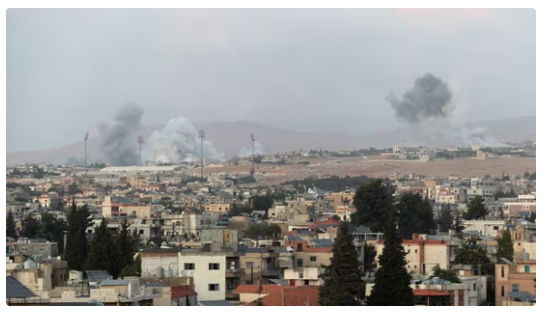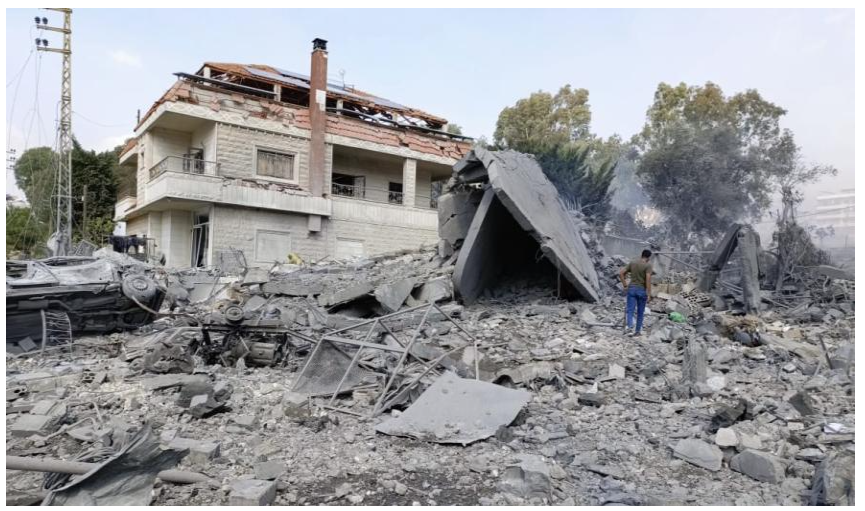Israel escalates air strikes on Lebanon despite global calls for a ceasefire. The conflict continues to escalate, with casualties rising daily.
Dozens killed in Israeli attacks, Lebanon’s health ministry says, as Israel claims it killed Hezbollah senior commander. Despite rising voices for cease-fire, Israel beefs up attacks on Lebanon.

Israel’s attacks leave dozens dead, says Lebanon’s health ministry; Israel says it killed senior Hezbollah commander.
About forty people died in the Israeli attacks on the villages of Lebanon, reported the health authorities, as the Israeli air forces continue the bombardment of the territory of Lebanon for the fourth day in a row despite the demands of the states of the world to cease fire.
Lebanon’s Ministry of Public Health found that at least 29 persons have been killed in Israeli raids – the large majority of which are said to be Syrian refugees in the town of Younine in the Bekaa valley in Lebanon on the border with Syria.
The other raids struck villages and towns in the southern part of the country, including the city of Tyre, while at least two people perished and fifteen more were injured in Beirut’s suburbs, according to the ministry.
Air forces hit about 220 targets connected with Hezbollah, the Lebanese militant organization, in the past 24 hours, said the Israeli military late on Thursday.
Earlier the military said it killed Muhammad Hossein Sarur, whom the military said was head of the Iran-aligned group’s aerial unit, in the Beirut attack.
Air Strikes On Lebanon struck most villages and towns in the southern part
In response to the Israeli claim, its main target, Hezbollah has not said anything so far.
In a series of statements on its Telegram channel on Thursday, Hezbollah said that it had launched over 50 missiles at Ahihud in the north of Haifa and fired salvoes of rockets at Kiryat Shmona, military targets and a command center in various locations north of Israel.
It said that it fired air defense weapons at the two Israeli warplanes and made them leave Lebanese territory.
Thursday’s attacks were made at a time when Israeli officials seemed increasingly dismissive of increasing international calls to cease hostilities.
US Secretary of State Antony Blinken said that world powers need a ceasefire and remarked he would be meeting with Israelis in New York.
Also Read: How to Use Pinterest for Affiliate Marketing: A Mini Best Guide For Beginners!
And in London, US Secretary of Defense Lloyd Austin also stated there is still an opening for diplomacy.
“So let me be clear, Israel and Lebanon can alter course, even as we have seen a marked increase in the hostilities over the past few days, but a diplomatic approach is still possible,” Austin said.

The United States and France presented on Wednesday a plan for observing non–battle for 21 days and demonstrated also concern with non–fight in Gaza.
Even before Obama could present more intense options, however, Prime Minister Benjamin Netanyahu emphatically signaled that such options are not available.
“Our policy is clear: we are pressing on with our operations against Hezbollah with all the might and will not stop until all goals – including the restoration of security for the residents of the north who fled their homes are met,” Netanyahu said on his arrival in New York where he is scheduled to speak to the UN General Assembly on Friday.
“This is the policy. Let no one mistake it.”
Thursday’s attacks extend a sharp increase in fighting in recent days that has displaced more than 90,000 people in Lebanon.
More than 600 people have been killed and thousands of others injured by Israeli air strikes since Monday across Lebanon.
It is the most violent week of fighting between Israel and Hezbollah since the two started exchanging cross-border artillery fire last October after the Hezbollah guerrilla group started firing rockets in response to Israel’s onslaught of Gaza.
While the exchanges went on for months, the strikes have been modest and sparingly limited to border corridors, although in recent weeks and after the declaration of intent of the Israeli army to transfer its operations from the Gaza Strip to Lebanon’s border, the actions of the Israeli army have escalated.
You May Like To Read: Hezbollah conflict with Israel: Israel’s Northern Border Conflict Intensifies
The declared purpose of the operation in Lebanon is with the help of which tens of thousands of people in the North will be able to return to their homes because of shelling from the territory of Lebanon.
The Israeli government has said that it has killed Hezbollah’s military commanders in a sequence of targeted killings.
In the past week alone, as has been in the report, the Israeli army conducted two air raids in which it assassinated Hezbollah’s elite Radwan unit deputy commander, Ibrahim Aqil together with other 15 senior commanders of the group as well as the head of its missile division, Ibrahim Qobissi.
The execution of the high ranking of the group continued when a series of blasts of the communication belonging to the Hezbollah rank and file and civil officers shook the country, and led to the death of 42 other people and left several thousands injured.
There is increasing concern whether Israel can carry out a ground campaign against Lebanon.
Despite denials from the White House that such an operation is imminent, the army’s Chief of Staf Herzi Halevi said on Wednesday to northern troops: be prepared for a ground operation.
